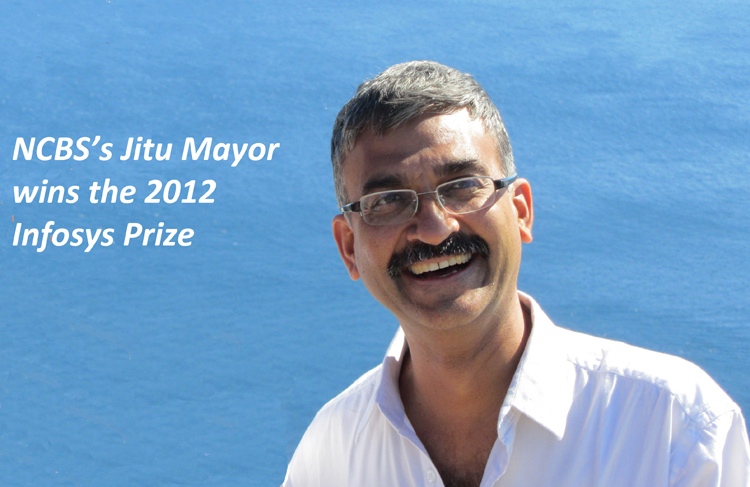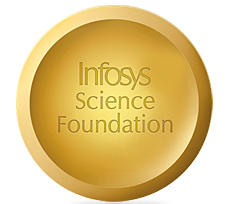Jitu Mayor wins the 2012 Infosys Prize for Life Sciences
Satyajit Mayor, a professor in NCBS's Cellular Organization and Signalling Group, and the Centre's Dean, has been awarded the 2012 Infosys Prize for Life Sciences. According to the citation for the award, Mayor's work "provides new insights into regulated cell surface organization and membrane dynamics, necessary for understanding self-organization and trafficking of membrane molecules in living cells, and in signaling between cells." The Infosys Prizes, awarded annually in six categories and providing cash prizes of Rs 50 Lakh each, are highly regarded within the research community. The jury panel is chaired by six internationally acclaimed academics, and in 2012 it included the Nobel laureate, Amartya Sen.
Like our own skin, the membrane of the cell plays a critical, but easily under-appreciated, role in the proper functioning of the organism. While Mayor and his colleagues have been researching the nature and activities of this membrane for several decades, the longer version of the Infosys citation suggests it is the work on the membrane's internal organisation that has most excited the judges. This line of research was brought to a culmination in a paper recently published in the journal Cell: Active Remodeling of Cortical Actin Regulates Spatiotemporal Organization of Cell Surface Molecules (Gowrishankar et al., 2012). It is not a coincidence that this work was done in Bangalore. It draws heavily on insights and approaches from a relatively new area of physics - soft active matter - which is actively studied at the Raman Research Institute (Madan Rao's group) and the Indian Institute of Science (Sriram Ramaswamy's group). Rao, who was a co-author on the paper, has had a long-standing and very fruitful collaboration with Mayor (and Ramaswamy). Ramaswamy's work on soft active matter led to him winning last year's Infosys Prize in the Physical Sciences category.
The particular findings of Gowrishankar et al., 2012 -quite hard-going for a non-specialist!- have been described in more accessible terms in a "preview" article in the journal Development Cell (click here, if you have institutional access), on the Infosys site (click here) and in an article by yours truly for NCBS News (click here). But an even more lucid and elegant description was forthcoming when I asked Ramaswamy for his thoughts on Mayor's prize. I have included his comments below in full.
"Satyajit Mayor's research has led a quiet revolution in cell biology. Decades ago, the fluid membrane enclosing the living cell was thought to be a homogeneous mixture of various lipids and proteins, a naive picture which was overturned initially in favour of an organization into domains or ''rafts''. This latter view too was seriously flawed: it produced unreasonably large domains in experiments on model membranes, and it borrowed the physics of segregation of immiscible fluids like oil and water. Such ideas have their origin in the physics of closed systems, whereas living systems are open systems characterized by a sustained throughput of energy. Among Jitu's remarkable discoveries:
- the membrane has a nanoscale and highly dynamic domain structure, nothing like fluid segregation at thermal equilibrium, and bearing striking evidence of active, energy-dissipating processes.
- the resulting compositional fluctuations lead to a classification of membrane components based on the nature of their participation in this complex dynamics.
- the machinery driving the fluctuations is linked to chemically powered transport by molecular machines on the network of filaments called the cytoskeleton, lying below the membrane and within the cell.
The resulting organization has profound consequences for cell biology through endocytosis, the process of membrane deformation through which the cell facilitates the entry of material.
Jitu's brilliance lies in a deep understanding of the chemical and physical processes of cell biology, extraordinary cleverness in the use of optical imaging and tracking, and a superb ability to engage with the ideas and methods of neighbouring fields, including physics. For example, the insights into the role of the cytoskeleton in membrane transport processes arose through a remarkable collaboration with Madan Rao.".
In further discussions with Mayor’s colleagues and students, it becomes clear that one of the secrets of his success is his personal and scientific openness - he is as fluid and co-operative as the membranes he studies. Mani Ramaswami, a professor at Trinity College, Dublin, says: “Jitu is a stimulating and inspiring colleague with the charisma to attract top scientists into collaborations that almost inevitably push the frontiers of multiple fields (e.g. microscopy, developmental biology, immunology and neuroscience).”
Darius Köster, who has post-docced for 18 months in Mayor’s lab, calls him “a natural networker” adding that: “When he returns from conferences he is always ready to tell you about someone you must get in contact with. He believes in the total sharing of knowledge. That is the atmosphere I grew up in as a scientist, so I was very happy to experience it here too”.
Shahid Jameel, a professor in Delhi’s International Centre for Genetic Engineering and Biotechnology, has been collaborating with Mayor for nearly a decade investigating proteins potentially relevant to HIV immunity. What was largely a fundamental research project has now morphed into one with clinical implications, leading to the involvement of NCBS’s entrepreneurial partner, C-CAMP. Jameel says that Mayor has always been “an intellectual driving force for this collaboration”. And he adds that: “While the science we did was nice, the friendship that we have nurtured over the years and the time we have spent discussing other interests, are equally valuable. Besides being a very rigorous and skeptical scientist, Jitu is a wonderful person and a great role model”.
Suvrajit Saha, a PhD student in Mayor’s lab, and an author on Gowrishankar et al., 2012, notes that Mayor tries to give his students as much international exposure as possible. “He encourages his students to go to the big conferences, but just as importantly, working in the lab makes you intellectually prepared for the meetings. Jitu’s insistence on excellence has helped me develop a strong sense of critical self-assessment, and this has been very instrumental in my growth as a scientist”.
One of Mayor's early PhD students at NCBS was Rajat Varma, now a tenure track investigator at the US National Institutes of Health. Their Nature paper of 1998 initiated the use of a fluorescence technique -homo-FRET- in live cells, paving the way for the redrawing of the landscape of membrane architecture that soon followed. Being in Mayor's lab was "a great learning experience" says Varma. "I will always remember Jitu as a very focused and driven scientist. He was never afraid of asking the toughest and the most unconventional questions and taught us how to do the same. Particularly, in my case, he facilitated a smooth transition from physics to cell biology. He trained us rigorously in light microscopy and cell biology, which helped us build our careers in various fields of biology".
Mayor would be happy to see all these comments from his colleagues, not because of what they say about him, but for what they draw attention to: that modern biological research is a long-term, interdisciplinary team effort. Last Friday Mayor was surprised at the award announcement function when his whole lab had turned up in advance of him. He was quoted by The Hindu as saying that the award left him "deeply honoured and quite embarrassed", and that, "The prize I've been rewarded is for all of us".


Comments
Congrats Dr.Mayor, but you
Dr. Mayor. Congratulations
Congratulations Jitu! It is
Congrats to Satyajit Mayor,
Kind of effort i have seen
Congrats to a brilliant
Congrats Jitu!
Congardulations Satyajit
Post new comment